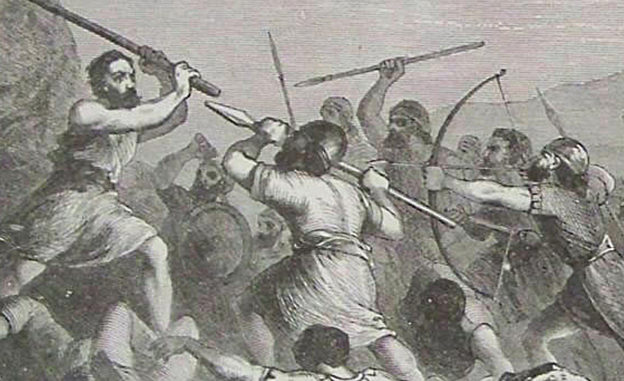Sometimes in the Bible, just as in our everyday life, there are people who play a significant role but only in passing, then fade away. Someone who provides support in our time of need, then is only a memory, or a person whose actions save many only to fade into obscurity.
Shamgar, a judge whose account is sandwiched between the account of Ehud and the account of Deborah and Barak, is just one of those important but passing characters. We do not know much about who he was, where he came from, what he did, and what effect it had on Israel. He only rates a one verse mention. But he is still important, because the Bible points him out.
Shamgar’s account, brief as it is, reminds us that God works through the ordinary and the transitory, just as he works through the dramatic. It also reminds us that the issues God’s People face can be issues faced later, even if the times seem unique. And it also reminds us that sometimes God’s salvation plan is advanced by those who seem to be outsiders, but have come to sympathise with us.
After Ehud defeated the Moabites, Israel rested for eighty years (v.30). But this was not the end of their troubles. Other foreign nations would arise and cause problems.
Ehud’s successor was a man named Shamgar. We know very little about Shamgar. His name is likely not Israelite, which suggests he was either a foreigner whose acts helped Israel, or more likely (in my view) a foreigner who became a follower of God and sympathised with God’s People.
Shamgar is named as a son of Anath. This may mean he was a worshipper of Anath, a Canaanite goddess of war associated with Baal. Or perhaps Shamgar lived in a Beth-Anath in the area of Judah in the South of Israel and was thus one of its sons, like a rugby player being the “Paekakariki Express” or another title; there were places named such in north and South Israel (Judges 1:33, Josh. 15:59).
We also do not know if Shamgar acted alone, or with a few friends, or with a local militia. What we do know is that he “killed 600 of the Philistines with an oxgoad, and he also saved Israel” (v.31). 600 is a sizable number to kill. Perhaps it was a raiding party or a scouting party looking for easy prey; their lack of return suggested it was unwise to send more troops.
What we do know is that Shamgar used an oxgoad as his weapon. This was essentially a large spear, about two metres long. One end contained a sharp prick to goad the oxen where they would otherwise not like to go, thank you. The other end had a spade for cleaning the plough that oxen often pulled. This tool of animal husbandry could serve as a useful spear or bayonet as an improvised weapon, or an effective club.
We also know the enemy that Shamgar vanquished – the Philistines. The Philistines were mentioned in Chapter 1 with their iron chariots, but otherwise have not appeared until now in Judges. Later, they will become Public Enemy Number 1 by the time of Samson, and a problem even into King David’s reign. But before Samson, Saul and David battled the Philistines, Shamgar defeated them and set them back in their plans for a time, and thus saved Israel.
Shamgar must have been a public figure of his day, because Deborah knew of him (5:6). But by the time Judges was compiled, Shamgar was relegated to a footnote of history. Someone to mention, but not to expand on.
Shamgar, in other words, for all his past deeds, was another transitory figure God worked through to advance his plans. God used Shamgar, but the lesson of Shamgar is that God uses all sorts of people to advance his plans. Even people who are reduced to minor players in Judges. Even people who never get a mention.
In the same way, God uses us to advance his plans. Not just the Big People of history (most who will be forgotten in enough time anyway), but ordinary everyday people. Whatever our gifts, our place, and what we have to hand, God uses us to advance his plans. Others may not know, but God knows.
We also see that the Philistines, who still troubled Israel hundreds of years later, were Shamgar’s foe. Likewise, many of the issues the church faces today, whether moral, spiritual, or physical, are issues faced by the church throughout the ages. We can take comfort that just as God delivered his people in the past again and again, so too he will deliver us today from the same issues facing us.
Finally, Shamgar was an outsider who God used to deliver his people. Sometimes, outsiders deliver God’s people from their troubles. After all, what greater outsider is there than the Creator of Creation, God the Son? He became human like us, sympathised with us, and delivered us from our enemies of sin and death.

